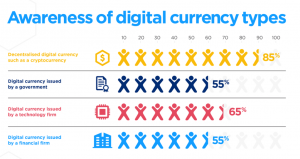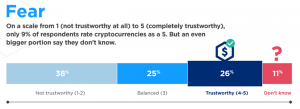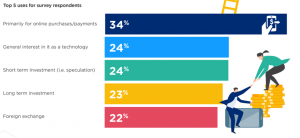Public awareness of cryptocurrencies is growing, with 26% trusting them. This is evidenced by the dataA survey conducted by The Economist for the payment company Crypto.com.
The study was conducted between January and February 2020 and more than three thousand respondents took part in it.
According to the study results, 85% of respondentsknow what cryptocurrencies are or have used them, 65% — about digital currencies issued by technology companies, 55% are aware of central bank digital currencies (CBDC) and another 55% — about digital currencies of financial companies.

At the same time, according to the survey, most often users of cryptocurrencies are people with higher education.
At the same time, 38% of respondents consider cryptocurrencies unreliable, 26% trust such assets. CBDC inspires confidence among the majority of respondents (54%).

“Privacy, security and education are three key areas that the crypto industry really needs to improve for greater adoption,” —Crypto.com Chief Operating Officer Eric Anziani told Cointelegraph.
Among the main obstacles to the adoption of cryptocurrencies, respondents themselves indicated a lack of understanding of their areas of application (44%) and technology security (32%).
In most cases (34%) cryptocurrenciesare used for online payments, in 24% the main interest of their owners is the technology itself, another 24% considers them as a short-term investment, 23% — as a long-term

Recall, according to a previous surveyHSB companies, 36% of US small and medium-sized businesses in the USA accept cryptocurrencies as payment, and 59% of them previously acquired such assets for their own use.




